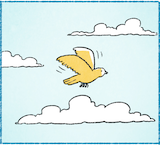


อันนี้คืออี่หยัง อันนี้คือขี้ฝ้า หลือว่าก้อนเมกเนาะ
ขี้ฝ้านี้มันอยู่ใส ขี้ฝ้านี้มันอยู่เทิงฟ้า อยู่เทิงฟ้า ลอยโอ่งโล่งๆ อยู่เทิงฟ้าพุ้นหละ
แล้วขี้ฝ้าอยู่นำขี้ดินได้บ่ บ่ ขี้ฝ้าอยู่นำขี้ดินบ่ได้ ขี้ฝ้ามันต้องอยู่เทิงฟ้า อยู่เทิงสูงๆ อยู่เทิงอากาด
ขี้ฝ้ามันก้อนใหญ่บ่ กะใหญ่อยู่ บางก้อนกะก้อนบักใหญ่หนึ่ง บางก้อนกะก้อนน้อยๆ แล้วแต่มวนอากาดหลือว่าไอน้ำของมันเนาะ
ตอนนี้เฮาเห็นขี้ฝ้าอยู่จักก้อน ตอนนี้เห็นขี้ฝ้าอยู่สามก้อน กำลังลอยโอ่งโล่งๆ อยู่เทิงท้องฟ้าสูงๆ พุ้นหนะ
14
อันนี้คืออี่หยัง อันนี้คือเคี่ยงบิน
เคี่ยงบินลำใหญ่บ่ ลำใหญ่อยู่ ลำบักใหญ่หนึ่ง
เคี่ยงบินมีไว้เฮ็ดหญัง เคี่ยงบินกะมีไว้ถ้าขี่ มีไว้ถ้านั่งไปหั้นไปหนี้
เคี่ยงบินมันนั่งได้จักคน แล้วแต่ เป็นล้อยเป็นพันคนกะได้ แล้วแต่เคี่ยงบิน เคี่ยงใหญ่กะนั่งได้หลาย เคี่ยงน้อยกะนั่งได้หน้อย แล้วแต่เคี่ยงบินเนาะ
แล้วเคี่ยงบินมีคนขับคือลดบ่ กะมีคือกัน เคี่ยงบินกะมีคนขับคือลดคือลดไฟคือกัน
คนขับเคี่ยงบินหนิเขาเอิ้นว่าหญัง กะเอิ้นว่าคนขับเคี่ยงบิน หลือว่ากับตันเนาะ อันนี้กะเขาเอิ้นว่าคนขับเคี่ยงบินหลือว่ากับตัน
เคี่ยงบินมันสีอี่หยัง เคี่ยงบินสีซมพู สีซมพูอ่องต่องอยู่
แล้วเคี่ยงบินอยู่ใสตอนนี้ เคี่ยงบินกำลังบินอยู่เทิงท้องฟ้า บินอยู่สูงเติบ สูงบักคักหนึ่ง
แล้วเคี่ยงบินมันบินในน้ำได้บ่ บ่ เคี่ยงบินมันลงน้ำบ่ได้ มันต้องบินขึ้นฟ้า บินขึ้นสูงๆ พุ้นหนะ เพาะว่าเคี่ยงบินมันบ่แม่นเลีย
15
อันนี้คืออี่หยัง อันนี้เป็นนก อันนี้คือนกเนาะ
นกโตใหญ่บ่ บ่ นกโตบ่ใหญ่หลาย นกโตน้อยๆ หนึ่ง กำลังบินอยู่เทิงท้องฟ้า
นกมันโตสีหญัง นกมันโตสีเหลียง เหลียงเทิงโตเหลียงเทิงปีกของมันเอาโลด กำลังบินท่วนๆๆ อยู่เทิงฟ้าพุ้นหนะ
ตอนนี้มีนกจักโต มีนกอยู่โตเดียว นกโตเดียวกำลังบินอยู่โตเดียวข้อหล้อของมันนั้นหละ
Link to overview page
Link to dictionary
| Isaan | Pronunciation | Tones | Thai | English/Notes |
|---|---|---|---|---|
| อัน | an | M | อัน | 1. thing, object 2. general clf. for objects |
| นี้ | ni: | HF | นี้ | 1. this 2. here |
| คือ | khʉ: | HR | คือ | 1. to be, to resemble, like, as 2. why {บักหล้าคือบ่เก็บโต่ะแน่ = [addressing a young boy] Why haven't you cleared the table?} |
| อี่หยัง | i:-yaŋ | H-M | อะไร | 1. what {นี้คืออี่หยัง = What is this?} {มื้อนี้เจ้าเฮ็ดอี่หยัง = What are you doing today?} {กินเข้างายกับอี่หยัง = What did you have for breakfast?} 2. something, anything, (in negations) nothing {บ่ต้องเฮ็ดอี่หยังอีกเลยนอกจากใส่ปุย = [we] don't need to do anything besides adding fertilizer} |
| ขี้ฝ้า | khi:-fa: | LF-LF | เมฆ | cloud {ขี้ฝ้ามีหลายอยู่ ขี้ฝ้ามันมีเต็มท้องฟ้าอยู่ = there are many clouds, there are clouds all over the sky} |
| หลือ | lʉ: | M | หรือ | or |
| ว่า | wa: | H | ว่า | 1. that, as {คำว่า X = the word X} 2. to say |
| ก้อนเมก | gɔ:n-me:k | HF-HF | ก้อนเมฆ | cloud Notes: see also ขี้ฝ้า |
| เนาะ | nɔ | H | เนาะ | final particle: makes the statement softer, looking for agreement |
| มัน | man | HR | มัน | it (also used to refer to people) |
| อยู่ | yu: | H | อยู่ | 1. to be (located) at 2. yet, still 3. auxiliary indicating continuous or progressive action {ทอดปาอยู่ในกะทะ = (in the process of) frying a fish in the pan} {แม่กำลังเมี้ยนเฮียนอยู่ = mother is cleaning/tidying up the house} |
| ใส | sai | M | (ที่)ไหน | 1. where? {สิไปใส = Where are [you] going?} {มาแต่ใส = Where are [you] coming from?} {กะทะอยู่ใส = Where's the pan?} 2. somewhere, anywhere {ใสกะได้ = anywhere, wherever you like} |
| เทิง | thə:ŋ | HR | บน | 1. on, on top of, at, in {เทิงโต่ะ = at/on the table} {กบมันนั่งอยู่เทิงใบบัว = the frog is sitting on the lotus leaf} {เทิงท้องฟ้า = in the sky} {มันแล่นอยู่เทิงลาง = [the train] runs on rails} {มีคนนั่งอยู่เทิงลดสามล้อสามคน = there are three people sitting in the tuk tuk} 2. up, upward Notes: pronunciation: also realized as ทัง |
| ฟ้า | fa: | HF | ฟ้า | 1. sky {เคี่ยงบินมันกำลังบินขึ้นฟ้า = the airplane is taking off into the sky} 2. color: blue |
| ลอย | lɔ:i | HR | ลอย | 1. to float, to swim 2. to soar 3. smoke/steam: to rise |
| โอ่งโล่ง | o:ŋ-lo:ŋ | H-H | ลอยอยู่ | floating |
| พุ้นหละ | phun-la | HF-M | นู่นแหละ | auxiliary for emphasis at the end of a phrase Notes: see also พุ้นหนะ |
| แล้ว | lɛ:o | HF | แล้ว | 1. finished 2. already 3. and then, and next (especially แล้วกะ) 4. auxiliary for past tense |
| นำ | nam | HR | 1. at, in 2. with, together with {บ่สามาดถือไปนำได้ = [you] can't carry it around} {กินบักแตงโมนำเฮาบ่ = Will you eat watermelon with me?} 3. to lead, to accompany, to go with {เด็กน้อยญ่างไปนำแม่ = the daughter follows her mother} |
|
| ขี้ดิน | khi:-din | LF-M | ดิน | earth, soil |
| ได้ | dai | HF | ได้ | 1. can 2. to get, to obtain 3. before verb: indicating past tense 4. บ่ได้ + verb: not |
| บ่ | bɔ: | H | ไม่ | 1. no, not 2. question particle, transforming a statement into a question Notes: spelling exception in line with common usage on social media |
| ต้อง | tɔŋ | HF | ต้อง | to have to, must |
| สูง | su:ŋ | M | สูง | high, tall |
| อากาด | a:-ga:t | M-LF | อากาศ | 1. weather, climate 2. air |
| ก้อน | gɔ:n | HF | ก้อน | 1. piece, lump, mass, chunk 2. clf. for bars of soap, stones, clouds, ice cubes |
| ใหญ่ | ɲai | H | ใหญ่ | large, big |
| กะ | ga | M | ก็ | 1. then, consequently 2. also |
| บาง | ba:ŋ | M | บาง | 1. some {สัดบางโตบ่มีขา = some animals don't have legs} {บางคนสิมักกินกวยเตียวแทนเข้า = some people like to eat noodle soup instead of rice (dishes)} {บางสิ่งบางอย่าง = something, anything} 2. thin |
| บัก | bak | M | 1. intensifier before adjectives {ปาโตบักใหญ่ = a (very) large fish} 2. prefix in front of fruits and vegetables {บักแตงโม = watermelon} 3. can be used as a reference for a male person of the same or younger age {บักอันนี้ = this lad} |
|
| หนึ่ง | nʉŋ | H | หนึ่ง | 1. one 2. after adjective: intensifier {บักคักหนึ่ง = very much} {อันบักใหญ่หนึ่ง = very large}, or attenuates the meaning {กะดาดมันแผ่นน้อยๆ หนึ่ง = the piece of paper is [relatively] small} |
| น้อย | nɔ:i | HF | น้อย | 1. few, little 2. small |
| แล้วแต่ | lɛ:o-tɛ: | HF-H | แล้วแต่ | up to, depending on |
| มวนอากาด | mu:an-a:-ga:t | HR-M-LF | มวลอากาศ | air mass |
| ไอน้ำ | ai-na:m | M-HF | ไอน้ำ | steam, vapour |
| ของ | khɔ:ŋ | M | ของ | of, belonging to |
| ตอนนี้ | tɔ:n-ni: | M-HF | ตอนนี้ | now |
| เฮา | hao | HR | เรา | 1. personal pronoun: we 2. personal pronoun: I |
| เห็น | hen | M | เห็น | to see |
| จัก | jak | M | จัก | 1. answer to a question: [I] don't know, don't know exactly, [I'm] not sure {พุซายคนนี้เขาเถ้าไป่ จัก จักเถ้าหลือบ่เถ้า เบิ่งบ่ค่อยออก = Is this man here already old? I don't know. I can't see clearly whether he's old or not.} {เขาเว้ากันอยู่ใส จักคือกัน = Where are they talking? I don't know either.} 2. exact(ly), what exactly {จักต้มอี่หยังกะบ่ฮู้ = I don't know what (exactly) he is cooking} {บ่ลู้คือกันจักปาอี่หยัง = I don't know either what kind of fish this is} 3. how much/many? {ต้นไม้มีจักต้น = How many trees are there?} {ตอนนี้จักโมงแล้ว = What time is it now?} {มือของเฮานี้สิมีจักนิ้ว = How many fingers do our hands have?} 4. a bit, a little bit {จักหน่อย/จักหน่อยหนึ่ง = a bit, a little bit} |
| สาม | sa:m | M | สาม | three |
| กำลัง | gam-laŋ | M-HR | กำลัง | auxiliary indicating continuous or progressive action |
| ท้องฟ้า | thɔ:ŋ-fa: | HF-HF | ท้องฟ้า | sky |
| พุ้นหนะ | phun-na | HF-H | นู่นแหละ | auxiliary for emphasis at the end of a phrase Notes: variant of พุ้นหละ |
| เคี่ยงบิน | khi:aŋ-bin | H-M | เครื่องบิน | airplane |
| ลำ | lam | HR | ลำ | clf. for airplanes, boats, tree trunks |
| มี | mi: | HR | มี | 1. to have 2. there is |
| ไว้ | wai | HF | ไว้ | 1. to keep, to put, to place, to retain, to save, to reserve {เขาเอาหัวของเขาไว้ใส = Where does she put her head?} {หมาสิเลี้ยงไว้บ้าน = dogs are kept/raised in the house} {ไก่เลี้ยงไว้ในคอก = chicken are kept/raised in a coop} {หน้ามันบังไว้ = the face is covered/not visible} {เขาเอาโทละสับวางไว้หู = he holds the phone to his ear} 2. for {นาลิกาปุกมีไว้เฮ็ดหญัง = What is an alarm clock for?} {หม้อเอาไว้เฮ็ดแนวกิน = a pot is used to make food} {ก่องเอาไว้เฮ็ดหญัง ก่องเอาไว้ใส่ของ = What is the box for? It's for putting in stuff.} Notes: see also ไว้ถ้า |
| เฮ็ด | het | H | ทำ | to do, to make |
| หญัง | ɲaŋ | M | อะไร, เป็นหญัง = ทำไม | 1. what {เขากำลังเฮ็ดหญัง = What is he doing?} {ธูปเอาไว้เฮ็ดหญัง = What are incense sticks for?} 2. something, anything, (nothing) 3. เป็นหญัง[...]คือ in initial position: why {เป็นหญังเขาคือใส่บักพิกลงไปในกวยเตียว = Why is he putting chili in [his] noodle soup?} {เป็นหญังหน้าต่างมันคือเปิด = Why is the window open?} {เป็นหญังมันคือมีควนไฟ = Why is there smoke?} |
| ไว้ถ้า | wai-tha: | HF-LF | usually in a positive statement or answer: is for, is used for, has the purpose of {กะทะมีไว้ถ้าทอด = a pan is for frying} {น้ำบักนาวมีไว้ถ้าปุงอาหาน = lime juice is used to season food} {ปากกามีไว้ถ้าเขียน = a pen is for writing} {กะเทียมเอาไว้ถ้าเฮ็ดแนวกิน = garlic is used to make food} {ขาเอาไว้ถ้าญ่าง = legs are for walking} {เกิบเอาไว้ถ้าใส่ = shoes are for wearing} Notes: see also ไว้ |
|
| ขี่ | khi: | H | ขี่ | to ride, to drive {ขี่มอเตอไซ = to ride a motorbike} {ขี่ควย = to ride on a buffalo} {ขี่เลีย = to take or travel on a boat} |
| นั่ง | naŋ | H | นั่ง | to sit |
| ไป | pai | M | ไป | 1. to go 2. auxiliary indicating action extending into the future |
| หั้น | han | LF | ที่นั่น | there, over there |
| หนี้ | ni: | LF | นี่ | here |
| คน | khon | HR | คน | person, people |
| เป็น | pen | M | เป็น | 1. to be, to exist 2. to be able to 3. to suffer, sth. happens to 4. เป็นหญัง[...]คือ in initial position: why? {เป็นหญังเขากะคือแปงฟัน = Why is he brushing his teeth?} {เป็นหญังเคี่ยงบินมันคือสิตก = Why is the airplane falling down?} |
| ล้อย | lɔ:i | HF | ร้อย | hundred |
| พัน | phan | HR | พัน | thousand |
| เคี่ยง | khi:aŋ | H | เครื่อง | 1. machine, engine 2. clf. for machines, airplanes, electronic devices etc. Notes: pronunciation: also realized as เคื่อง |
| หลาย | la:i | M | เยอะ, มาก | many, much, very |
| หน้อย | nɔ:i | LF | น้อย | 1. a little/some 2. not long |
| ขับ | khap | M | ขับ | to drive, to ride |
| ลด | lot | H | รถ | 1. car, motorized vehicle 2. vehicle, cart {ลดขายแนวกิน = food cart} |
| คือกัน | khʉ:-gan | HR-M | เหมือนกัน | 1. also, likewise, similarly {ยินดีที่ได้ฮู้จักคือกันคับ = Nice to meet you too!} 2. in negative sentences: either {บ่ลู้คือกัน = I don't know either} {จักคือกัน = I don't know (either)} |
| ลดไฟ | lot-fai | H-HR | รถไฟ | train |
| หนิ | ni | M | นี่แหละ, เหรอ/หรอ | 1. particle used to emphasize a statement or form (or add to) a question {เป็นตาแซบคือหญังหนิ = it's really tasty} {เคี่ยงพอเท่าๆ หนิ = the [radio] is appropriately sized (i.e., not too large)} 2. variant of นี้ = this Notes: translation to be determined; maybe sometimes like Thai นี่แหละ; other examples given: อยู่ใสหนิ อยู่ตลาดหนิ กินเข้าไป่หนิ |
| เขา | khao | M | เขา | personal pronoun: he, she |
| เอิ้น | ə:n | HF | พูด, เรียก | to call, to say {เอิ้นง่ายๆ ว่า = in other words} {คนอี่สานเอิ้นว่า เป็นลูกคนกก = Isaan people call her ลูกคนกก} |
| กับตัน | gap-tan | M-M | กัปตัน | captain |
| สี | si: | M | สี | 1. color 2. colored pencil, crayon |
| ซมพู | som-phu: | HR-HR | ชมพู | pink |
| อ่องต่อง | ɔŋ-tɔŋ | H-H | color: very pink, sweet pink {(สี)ซมพูอ่องต่อง = very pink, sweet pink} | |
| บิน | bin | M | บิน | to fly |
| เติบ | tə:p | LF | intensifier: very, much {เว้ากันโดนเติบ = to talk a long time} | |
| บักคักหนึ่ง | bak-khak-nʉŋ | M-H-H | intensifier: very, very much (variant of คัก) | |
| ใน | nai | HR | ใน | in, within |
| น้ำ | na:m | HF | น้ำ | 1. water 2. drink, soft drink, juice |
| ลง | loŋ | HR | ลง | 1. to descend, to lower, to go down 2. down 3. bus/train etc.: to get off, to disembark {คนกำลังลงลดบั่ด = people are getting off the bus} 4. boat/ship etc.: to get on, to board {เขากำลังญ่างลงเลีย = he's boarding/getting on the boat} |
| ขึ้น | khʉn | LF | ขึ้น | 1. to go up, to increase 2. sun: to rise {ตะเว็นกำลังขึ้น = the sun is rising} 3. more 4. bus/train etc.: to get on, to board {พุโดยสานขึ้นลดไฟเบิดแล้ว = all passengers have boarded the train} |
| เพาะว่า | phɔ-wa: | H-H | เพราะว่า | because |
| บ่แม่น | bɔ:-mɛ:n | H-H | ไม่ใช่ | 1. not {เขาเป็นพุหญิง เขาบ่แม่นพุซาย = she's a woman, she's not a man} 2. no |
| เลีย | li:a | HR | เรือ | boat Notes: pronunciation: also realized as เลือ |
| นก | nok | H | นก | bird |
| โต | to: | M | ตัว | 1. body, self 2. clf. for animals, characters/letters/consonants, appliances, clothes (e.g., pairs of trousers, shirts) |
| เหลียง | li:aŋ | M | เหลือง | yellow |
| เทิง | thə:ŋ | HR | ทั้ง | 1. up to, all, all of, the whole of, altogether {เขาใส่กางเกงขาสั้นเทิงสองคน = both are wearing short trousers} {เขาเป็นพ่อของลูกเทิงสามคนนี้ = he's the father of these three [children] here} 2. เทิง ... เทิง ...: both ... and ..., ... as well as ... {เทิงมีใบพ้อม เทิงมีเหลียนพ้อม = there are notes as well as coins} Notes: pronunciation: also realized as ทัง |
| ปีก | pi:k | LF | ปีก | wing |
| เอาโลด | ao-lo:t | M-HF | เอาเลย, ทำเลย, จริงๆ | in final position: intensifier {โตส่ำกะทะเอาโลด = [a fish] as large as the pan!} {เกียบเต็มถ้วยเอาโลด = the bowl is almost full!} {ทะนาคานมันสิไปตั้งไว้อยู่ซู่หม้องเอาโลด = banks are everywhere!} |
| ท่วน | thu:an | H | เร็ว, เรื่อยๆ | 1. fast, quick(ly) 2. to be continuously doing something |
| เดียว | di:ao | M | เดียว | only, alone, single |
| ข้อหล้อ | khɔ:-lɔ: | LF-LF | เท่านั้น, ขนาดนั้น, น้อยๆ | only {ต้นไม้มีต้นเดียว ต้นเดียวข้อหล้อ = there's one tree, only one tree} {มีบ้านหลังเดียวข้อหล้อ = there's only one house} |
| นั้นหละ | nan-la | HF-M | นั่นแหละ | auxiliary for emphasis at the end of a phrase |